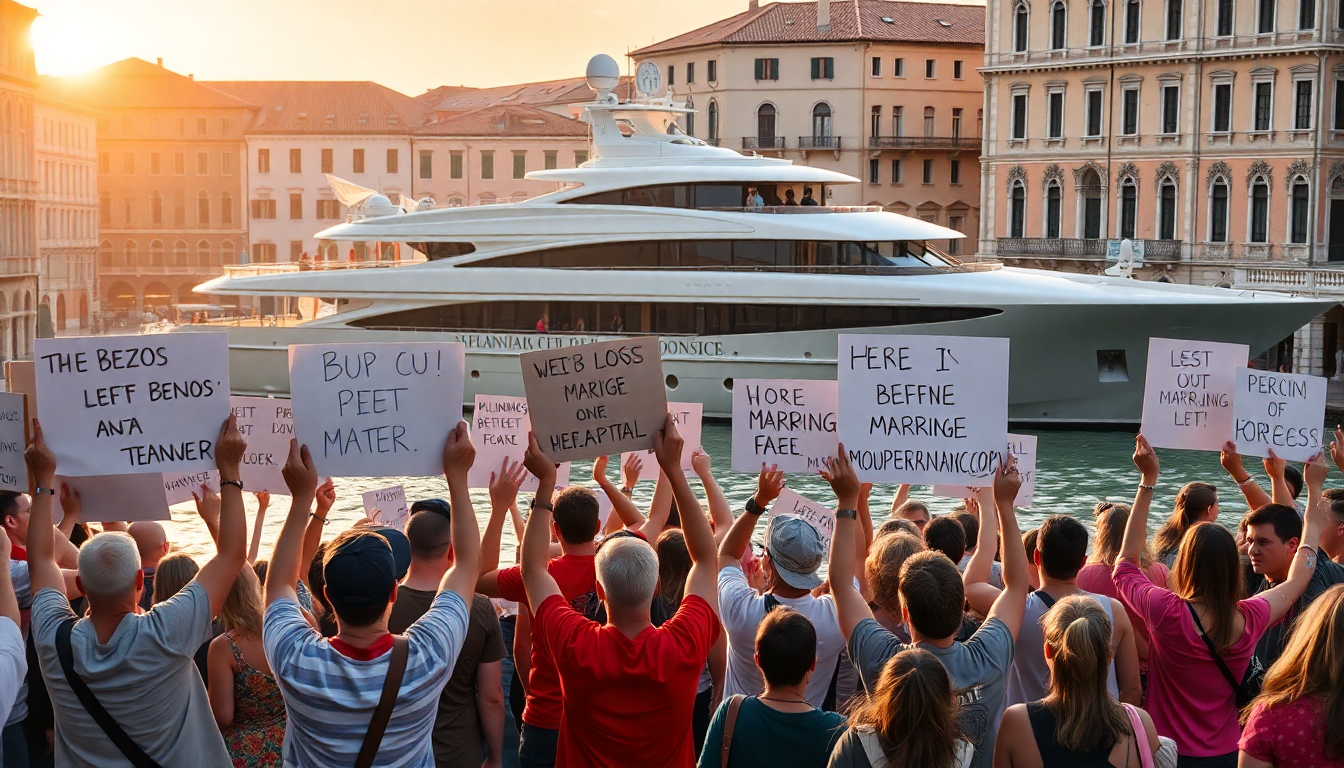Table of Contents
In the enchanting canals of Venice, a storm is brewing—not of rain, but of protest. Local activists are gearing up to voice their discontent over the extravagant wedding of Jeff Bezos and Lauren Sanchez, set to unfold on Bezos’ stunning $500 million superyacht, Koru. For many in the community, this wedding feels like a glaring symbol of elitism in a city already struggling with the weight of over-tourism. It raises a crucial question: How sustainable are these lavish gatherings in a place steeped in history and culture like Venice?
Local sentiment and protest actions
The mood among locals is charged. Many have branded Bezos and his fiancée as “oligarchs,” representing an ever-widening gap between the ultra-wealthy and the average citizen. One protestor didn’t hold back, declaring, “We will throw ourselves into the canal if we have to; we’ll make sure they choke on their wedding cake.” Such strong sentiments signal deeper frustrations, not just about the wedding, but about the economic disparities that prominent figures like Bezos seem to amplify.
The protest movement, aptly named No Space for Bezos, has even threatened to blockade key waterways leading into Venice. This direct action could disrupt wedding logistics and impact local businesses that depend on a steady supply chain. A representative from a local supermarket voiced their concerns: “Blockades would prevent necessary goods from reaching the city, leading to inflated prices during peak tourist season.” This situation underscores how intertwined local economies are with high-profile events; a few actions can have far-reaching consequences for the entire community.
Implications of over-tourism
The backlash against Bezos’ wedding is part of a broader story regarding over-tourism in southern Europe. Many residents feel increasingly sidelined by the flood of tourists and the commercialization of their beloved cities. This isn’t just happening in Venice; similar protests have sparked in other European hotspots like Barcelona and Lisbon, where locals argue that an influx of tourists has skyrocketed living costs and altered the essence of their neighborhoods. In Venice, tourism is a double-edged sword—the community grapples with the reality of catering to the whims of the wealthy while their own quality of life hangs in the balance.
Visible demonstrations have marked the recent protests, including a striking banner unfurled over St. Mark’s Tower, boldly crossing out the name “Bezos.” The No Space for Bezos campaign is leveraging various tactics, from distributing stickers to organizing marches, all aimed at raising awareness about their cause. Their actions highlight a growing movement against the perception that the rich are encroaching on spaces once cherished by local communities.
The future of luxury events in historic cities
As Bezos and Sanchez prepare to host around 200 guests for their opulent wedding, important questions arise about the future of luxury events in historic cities like Venice. With local opposition intensifying, it seems we might be on the brink of a re-evaluation regarding how such events are planned and their impact on the host community. As more residents articulate their discontent over the commercialization of their cultural heritage, finding a balance between hosting extravagant celebrations and respecting the needs of locals becomes crucial.
As protests evolve, all eyes will be on Venice—not just for the high-profile wedding but for how the city navigates the complex interplay of wealth, tourism, and local identity. The outcome here could set significant precedents for future events and how similar situations will be approached by both organizers and local communities. Will they find a way to coexist, or will the divide only deepen?


